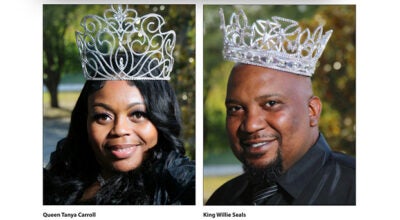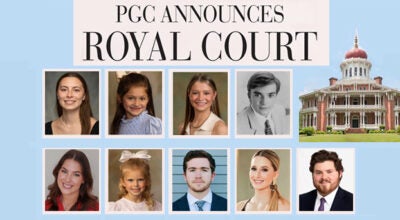Veteran decides to share experiences from World War II, Korea
Published 12:07 am Sunday, March 2, 2014

BRITTNEY LOHMILLER/THE NATCHEZ DEMOCRAT—
N.D. Fuller is a World War II and Korean Conflict veteran and served in the U.S. Naval Reserve for both wars. More than 60 years after his service in the Korean Conflict ended, Fuller has decided to tell his story from his war experiences.
N.D. Fuller has never really talked about his time in the U.S. Naval Reserve.
More than 60 years have passed since his service in the Korean Conflict ended and yet his son Kim hasn’t heard a lot about N.D.’s war-time experience in Korea or the Pacific theater of World War II. Kim was barely walking when his father shipped out to serve on a fuel tanker in the Pacific Ocean.
“We would never really sit down and talk about it,” Kim Fuller said. “Most of what I picked up was sitting down with him and a friend or someone else (at a military reunion). When I was able to go down and have the dinner with them and listen to (the veterans) talking, I think I was able to pick up more there than at any other time.”
N.D. at one time had souvenirs from his times overseas, but when his house burned in the mid-1950s, he lost most of them to the flames. Now, the few physical artifacts that remain connecting him to the years he spent on the seas are clippings and paper items — including the telegram he received telling him World War II was over — he sent to his mother.
And while some veterans may be reluctant to talk about their experiences due to feelings of guilt a desire to avoid burdening their families with the knowledge of their service, N.D. said he’s never talked about it because he didn’t think anybody would want to hear it.
“I am surprised anybody would be interested in it,” he said. “I was just a regular guy, there wasn’t anything special about anything.”
But now, as he approaches his ninth decade, N.D. has decided to share his story, partially at the prompting of Miss-Lou Veteran’s Coalition President Doug McCallister.
“You talk to one veteran and ask if he would like to talk about his military experience, sometimes they say ‘no’ and you forget it, but in that same instance, if you spend enough time with that person, they might start to talk about it,” McCallister said.
“In the veterans’ community, I see there is a tendency for veterans to talk with veterans, even more so than even family.”
McCallister said he prompted N.D. to share his Naval service experience because he was a Korean Conflict veteran, a group often overlooked in discussions of America’s war actions, even though many veterans of the Korean police action were also World War II veterans.
When Fuller sat down with McCallister, Kim and others to discuss his wartime experiences Wednesday, he was quick to say he was “lucky” in that he didn’t experience the harshest conditions of either conflict.
But as he talked about his time on a hospital ship in the Pacific Ocean, he had plenty of experiences to share that can only happen during war.
N.D. was 18 when he was called up for the draft in 1944. He elected to join the Naval Reserve, and completed boot camp in Idaho before he was stationed in San Francisco, standing guard duty for 11 months at the shipyard while construction and commissioning of the U.S.S. Hope was completed.
When the ship was ready to take to sea, N.D. and approximately 250 other seamen were assigned to it as crew, while approximately the same number of Army personnel was assigned as doctors on the boat, a floating triage base that followed behind the U.S. invasion of the Pacific islands and ferried the wounded to established land hospitals.
N.D. worked in the engine room, converting salt water to fresh water and making sure other vital benchmarks were met.
“One of the duties the engine room had was to keep the temperature (cool) on that morgue we had on (the ship), and I went down in there one night to check the temperature and they had a soldier laid out on the table,” N.D. said. “They had him cut from top to bottom and had all his insides in a bucket. They had operated on him and he died after they operated, and when they opened him up, they found more shrapnel on him that they didn’t get out.”
That wasn’t the only interaction N.D. had with the war fallen. The ship would sometimes conduct six or eight burials-at-sea a day, he said.
“I would always stand up back away from them when I was on ship or off duty,” he said. “I don’t know how many bodies (the morgue) would take care of, but it wasn’t very many.”
Even though hospital ships weren’t supposed to be war targets, N.D. said one night the ship’s captain was forced to steer in the direction of a torpedo that had been dropped at them in order to avoid it.
“(In the machine room), a lot of times it would be wait and see if something was going to come through the side of the ship,” he said. “Once, they dropped bombs on us, and you could hear them hit the water.”
The bombs hitting the water made a distinct noise, N.D. said, “Ka-lunk.”
When the war approached its end, the Hope moved to Japan, and a new danger.
“The sister ship of the Hope was coming out of Okinawa one night and they had a load of wounded,” N.D. said. “A suicide plane hit it right in the operating room. There were some nurses and doctors that got killed on that ship.”
The smell of burned bodies, he said, was overwhelming.
Other times, the wounded the Hope was transporting would suffer mental breakdowns after the trauma of battle.
“One time we were coming out of Lady Bay in the Philippines, and we had a soldier boy who jumped off the back of the ship,” he said. “They went back and got him.”
And sometimes, the hospital ship had to commit a little wartime subterfuge. International law didn’t allow the boat to transport troops, but one time the ship picked up three airmen who had ditched their plane.
“They brought them on the shop, but they had to wear hospital slack pajamas — they couldn’t wear their uniforms — because the Japanese had a right to stop the ship to inspect and see if we were transporting any military stuff,” N.D. said.
When the war ended, N.D. returned to the United States and picked up the same job he left, working for Chevron in the Cranfield area. The Mississippi seaman had traveled 50,000 miles on the ocean, crossed the equator 22 times and helped evacuate 8,000 patients to safer ground, and he was happy to have his feet back on solid ground.
But a few years later, as the Korean Conflict heated up, several of his acquaintances coaxed N.D. to re-enlist in the Navy Reserve with them. Natchez had a Reserve station at the time.
When the second war called him, N.D. shipped out of Norfolk, Va., on the aviation gasoline tanker, the U.S.S. Rio Grande.
“I thought we might get to go to Europe, but we went down through the Panama Canal to Honolulu, and we were based there,” he said. “We would transport Chevron aviation gasoline to the smaller islands in the Pacific, where the big tankers couldn’t go. The Rio Grande was about 300-feet long.”
Most of the men on the Rio Grande were World War II veterans, N.D. said, and life on the ship ran smoothly, maybe even a little boring. He worked in the machine shop on the boat, and in the 11 months he spent on the Rio Grande, they never saw war activity.
He did, however, develop a fondness for terra firma.
“When that land came into sight, I was glad to see it,” N.D. said. “I always got sick every time we went out.”
After nearly a year of hauling aviation fuel, N.D. was granted a hardship discharge from the Navy because he had two children at home.
He raised a family, continued working in the oil field and retired in 1986. He would occasionally attend military reunions, but otherwise his naval service wasn’t something he discussed.
And then one day, decades later, someone asked him to share his experiences, and N.D. had two hours worth of telling in him.
The difference, he said, was in the asking.
“Nobody had ever asked,” he said. “I was just a regular swabbie.”





